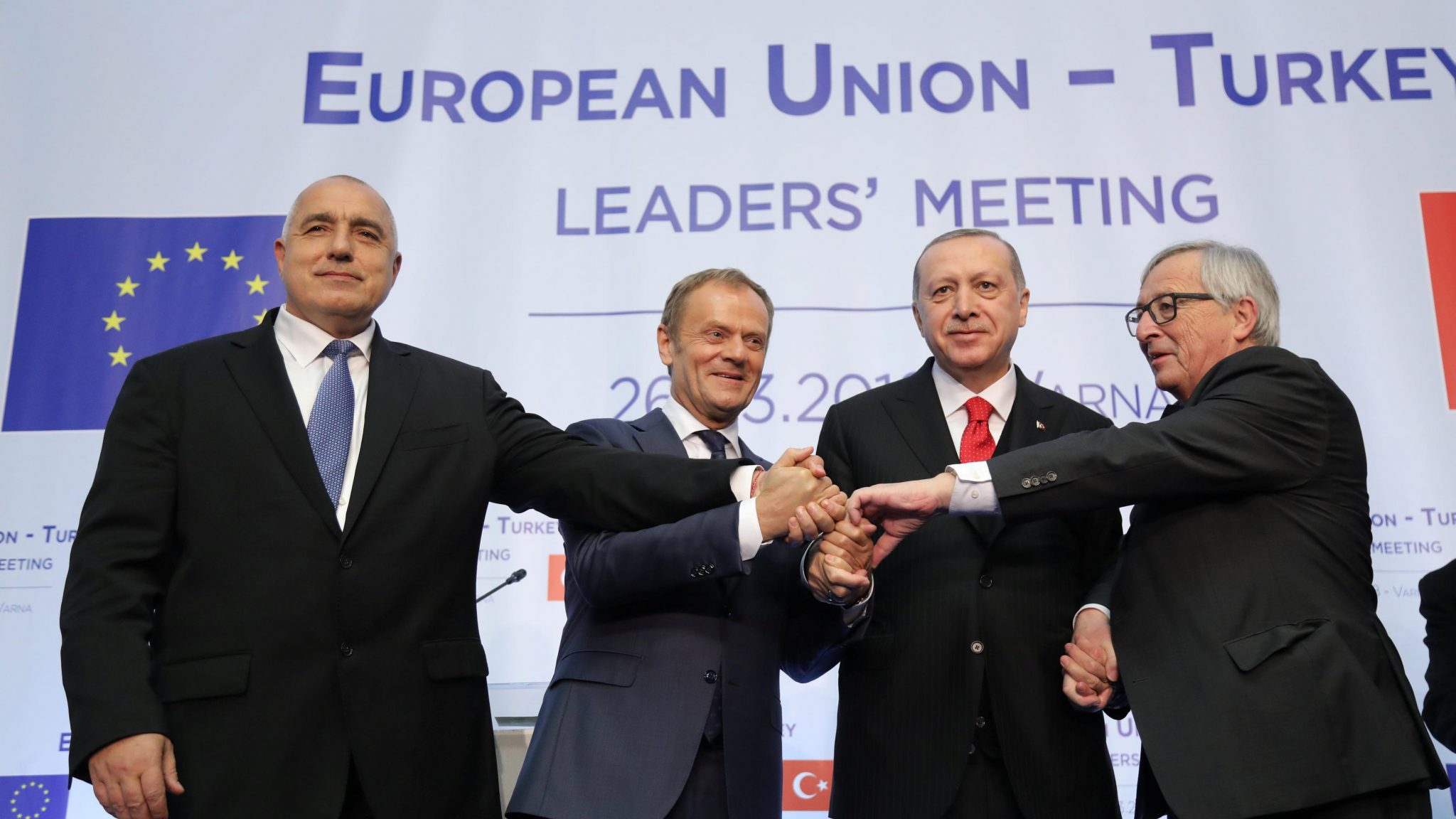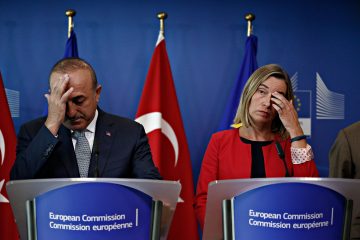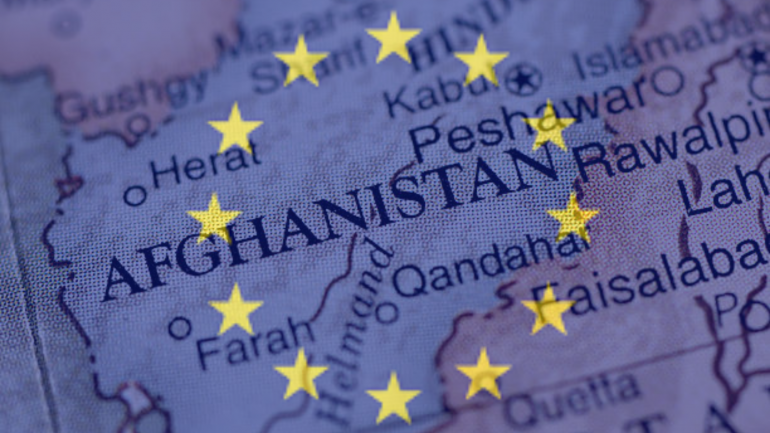
[authorbox authorid=”83″ title=”The Author”]
After Monday’s summit in Varna, Bulgaria’s Prime Minister Boyko Borissov could heave a sigh of relief. Beforehand, he feared the meeting between European Council President Donald Tusk and European President Jean-Claude Juncker with Turkey’s President Recep Tayyip Erdogan would be “a very heavy experience”.
But it turned out to be quite uneventful. As Donald Tusk remarked afterwards, “We didn’t achieve any kind of concrete compromise.”
The intention was to jointly assess matters of mutual interest and recent developments in Turkey and to share views on how to move the relationship between the EU and Turkey forward. Instead, it became a statement of already known positions with very little movement.
On the EU’s side, serious concerns were expressed about recent Turkish actions in the Eastern Mediterranean and the Aegean Sea as well as the situation in Afrin. Concerns were also expressed that some of the methods Turkey used to combat terror undermined fundamental freedoms and the rule of law. Turkey was reminded that as a candidate country it had committed to developing and upholding the highest standards of democracy.
There was appreciation of the impressive work Turkey has been doing in hosting more than 3 million Syrian refugees and in keeping their end of the bargain to stem the migration flows to Europe. According to Juncker by 87 percent. On Turkey’s side, Erdogan reminded the EU to cough up the second tranche of €3 billion that had been agreed and keep its commitment to visa liberalisation.
Furthermore, he hoped for an update of the Customs Union and called for an acceleration of accession talks President Erdogan also rejected the unjust criticism of Turkey’s anti-terror operations and instead expected the EU’s strong support.
All in all, it was an exercise in papering over the cracks and ignored the fundamental differences and change of direction that Erdogan’s Turkey has taken. Instead, it would be more useful to focus on major areas of disagreement, which show that the gap between Europe and Turkey is in fact widening.
A year ago the Office of the United Nations High Commissioner for Human Rights (OHCHR) published a report on the human rights violations and destruction of towns in Turkey’s southeast, which began with the Kurdish uprising in July 2015.
Now the OHCHR has published a second report, this time on the impact of the state of emergency on human rights in Turkey in the period January-December 2017. This
deals with the erosion of the rule of law and the mass purge of suspected members of the Gülen movement and their families since the failed coup in July 2016. However, the Turkish Foreign Ministry has condemned the OHCHR as “a collaborator of terrorist organizations”.
One of the stumbling blocks to visa liberalisation is the Turkish government’s broad definition of terrorism, which has now come to include anyone who is opposed to the government’s policies.
As the European Court of Human Rights noted in its judgments upholding the complaints by journalists Mehmet Altan and Sahin Alpay about the violation of their right to freedom of expression and to liberty and security: “criticism of governments and publication of information regarded by a country’s leaders as endangering national interests should not attract criminal charges for particularly serious offences such as belonging to or assisting a terrorist organisation, attempting to overthrow the government or the constitutional order or disseminating terrorist propaganda.”
On another level, at the meeting Juncker said that the EU wanted Turkey to be a real strategic partner, but how is this possible, as Turkey has occupied the northern third of Cyprus, an EU member state, since 1974? Under the Treaty of Guarantee Turkey claimed the right to intervene to prevent enosis (union with Greece) but ignored the corollary: with the sole aim of reestablishing the state of affairs created by the Treaty.
There are similar doubts about Turkey’s occupation of the Kurdish enclave of Afrin in northwestern Syria. President Erdogan stated initially that Turkey had no territorial claims but his spokesman later said that Turkey has no intention of returning Afrin to Assad’s regime. Since the success of Turkey’s first incursion into Syria in August 2016, Turkey has also established a de facto protectorate in the area between Afrin and the Euphrates.
Moreover, Erdogan has proclaimed his intention of taking control of the Kurdish-controlled area east of the Euphrates, in which case he will come into direct conflict with the U.S., which has supported Kurdish forces.
On the domestic front, Erdogan has taken further steps to ensure his and his AKP government’s reelection in local, parliamentary and presidential elections to be held next year. With the acquisition of the Dogan Media Group, Turkey’s largest, by the pro-Erdogan Demirören Group, 92 percent of the country’s media is now controlled by Erdogan.
This control has been reinforced by new internet legislation aimed at stifling criticism and plans to block VPN services which can evade these restrictions. More than 174,000 websites are already banned, so that politically, as one critic said, Turkey will be closer to China than the EU.
Turkey’s economy is shaky and marked by a growing current account deficit, the highest in emerging markets, double-digit inflation and a depreciating lira. The Central Bank’s diminishing foreign currency reserves are insufficient to plug the gap, so Turkey is dependent on short-term portfolio inflows. Erdogan’s senior economic advisor, Cemil Ertem, has admitted that this ‘hot money’ is a ticking time bomb under Turkey’s economy, as there has been a marked drop in long-term foreign investment.
Moody’s, the rating agency, has once again downgraded Turkey’s rating to junk status, among the reasons being the deterioration of Turkey’s geopolitical situation and the erosion of Turkey’s executive institutions. A columnist in Daily Sabah, a pro-Erdogan daily, replied that this report was obviously written in Fethullah Gülen’s office.
The government news agency Anadolu Agency has dismissed the European Parliament as all noise but no influence, which raises the question of whether the EU has any real leverage, now there is no longer the carrot of EU membership. However, Renate Sommer, rapporteur on Turkey for the EPP, believes it is time to use the stick.
The U.S. Congress is considering sanctions because of the unlawful detention of Americans citizens in Turkey and the European Parliament has in its resolution on Turkey of 6 July 2017 called on the Commission to include a clause on human rights and fundamental freedoms in an upgraded Customs Union, making these a key conditionality.
The European Court of Auditors has in a special report stated that there have been only limited results from the €9 billion allocated to Turkey in pre-accession aid, mainly due to a lack of political will on the part of the Turkish authorities. Leaders of three German parties, Horst Seehofer of CSU, Julia Klöckner of CDU and Christian Lindner of FDP, have called for pre-accession aid to Turkey to be halted, so this would be a good place to start.




